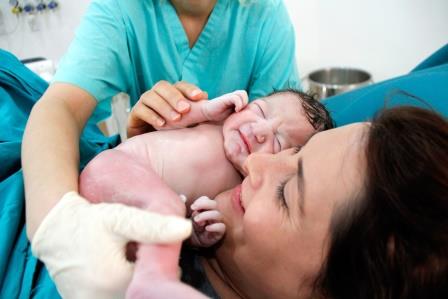Because of the rising caesarean sections in Delhi, chances are that most of your family, friends and peers have also had one. In fact, caesarean deliveries are now so common, they’ve become the new normal, which has given rise to some myths about normal deliveries.
Caesarean deliveries are the reason that many apprehensions exist about vaginal deliveries. Normal deliveries are now considered a brave act by care providers and continue to be surrounded by misleading information.
So we’d like to set the record straight by discussing these myths about normal deliveries below.
8 Myths About Normal Deliveries
Myth 1: Labour pain is intolerable
Although labour pain can be intense for some women, receiving the right support from their birthing partners and the labour room team can help them get through it and have a fulfilling birth experience.
One of the best ways to prepare for labour is by signing up for an antenatal class where women and their birthing partners are taught right exercises and breathing techniques to help manage pain.
Myth 2: A vaginal delivery leads to sexual dysfunction
A common misunderstanding surrounding vaginal deliveries is that they are directly related to sexual dysfunction or even a lowered sexual drive amongst women.
Women also worry about a lax vagina and pain during intercourse after a vaginal delivery.
But according to the American Congress of Obstetricians and Gynaecologists, the rates of sexual dysfunction are similar between caesareans and vaginal deliveries. Studies also claim that childbirth is not a major contributor to sexual dysfunction in women’s lives.
Myth 3: A vaginal delivery can cause a prolapse
A uterine prolapse occurs when the uterus descends from its normal position into the vagina.
The main contributing factor of uterine prolapse is one’s genetic predisposition to it; but no medical guideline suggests that you should have an elective Caesarean section to avoid prolapse.
Myth 4: I’l l need a Caesarean if my labour does not start naturally
l need a Caesarean if my labour does not start naturally
Inducing may be necessary to jumpstart labour for women whose pain is delayed or who might have an early delivery. In this case, a caesarean section is not a natural conclusion.
Inductions which are medically indicated have a high chance of leading to a successful normal delivery for first-time mothers and mothers who have had a previous normal delivery, especially if the pregnancy crosses 39 weeks.
Myth 5: Forceps and vacuum deliveries are always dangerous
Less than 10% of women having vaginal deliveries require forceps or a vacuum. In the hands of a skilled obstetrician, both methods can be very safe for a mother and her baby.
Myth 6: Vaginal deliveries are not safe for babies
The American Congress of Obstetricians and Gynaecologists (ACOG) recommends vaginal deliveries because “babies born vaginally have a lower risk of respiratory problems” and other long term benefits like a stronger autoimmune system and lower risks of respiratory distress, allergies, diabetes or obesity.
Babies also benefit from maternal stress hormones and the vaginal flora that gets transferred to them during a normal delivery.
Myth 7: I can’t try for a normal delivery because I’m short
By nature’s design, most women who are short and petite have small babies that can pass through the pelvis. You cannot know if your baby is too large for your pelvis unless you have a trial of labour.
Myth 8: A cord around my baby’s neck requires a Caesarean section
Babies have had cords around their necks since the beginning of time. In most cases, the loop of cord is loose and does not pose a threat.
The cord is also long enough for the baby to move through the birth canal without a problem.
Moreover, you will be closely monitored during labour and your obstetrician will be alert to any signs of the cord causing fetal distress. If there’s a problem, your baby will be delivered via caesarean.
At Sitaram Bhartia, we believe birth is a normal physiological event and most women should deliver with minimal intervention. This philosophy has helped us achieve a greater than 80% normal delivery rate in low-risk, first birth moms.
Seek expert advice from our expert gynaecologist at our hospital in South Delhi. Please call on +91 9871001458 to schedule a your in-person/online consultation.




